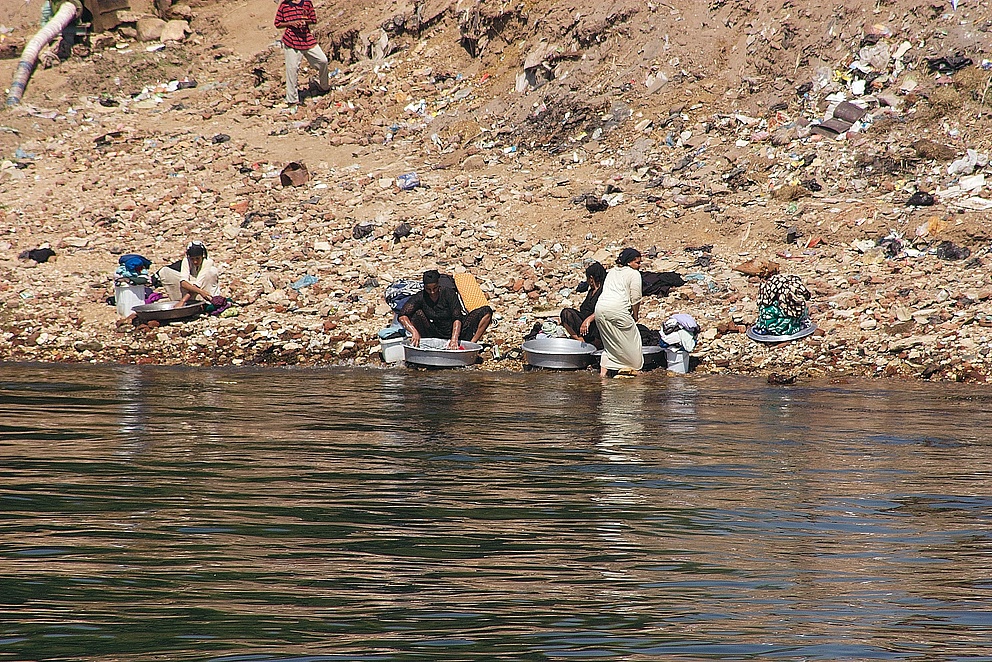

Contact
Press, Communications and Marketing
Tel.: +49 228 833-144
Fax: +49 228 833-441
presse[at]avh.de
The world is looking to Sharm El-Sheikh in Egypt, which is hosting this year’s United Nations Climate Change Conference (COP27). The country itself is an epicentre of the global climate crisis. Against the backdrop of continually worsening climatic developments in the African regions, the central topics of COP27 revolve around climate justice. How will the world deal with the fact that the most vulnerable countries, particularly in Africa, have contributed little to the climate crisis but are facing its most severe effects, such as droughts, heatwaves, flooding and concomitant food insecurity? How can and should the industrialised countries of the Global North compensate countries that have suffered heavy economic losses due to damage from climate-induced extreme weather events?
Sara Fouad, Egyptian professor of architecture, who specialises in waterways regeneration and is currently conducting research at the TUM, Germany, with a Georg Forster Research Fellowship from the Humboldt Foundation, shares her view on the situation in Egypt and how COP27 could bring much needed change.

Sara Fouad is a professor of architecture at the Arab Academy for Science and Technology and Maritime Transport, Cairo, and specializes in waterway restoration. She graduated from the School of Engineering at Alexandria University in 2008 with high honours and completed her Ph.D. at Ain Shams University, also in Egypt, in 2016. Her work focuses on understanding the vulnerability of waterways to on-going degradation and water stress in Egypt. In 2020, Sara received the prestigious Georg Forster Research Fellowship to conduct research at the chair of Landscape Architecture and Transformation at TUM Munich, Germany.
Humboldt Foundation: What should we know about the current environmental situation in your home country?
Sara Fouad: COP27 is taking place in Egypt, a country with absolute water scarcity that is also suffering from severe climate fluctuations. For instance, Egypt relies almost exclusively on surface water from the Nile River for 98 percent of its renewable water resources. This water comes from the precipitations in central and eastern Africa; fluctuations due to climate change impact water availability. Already now, annual water supplies drop below ~500 m3 per capita and are expected to decrease further due to the climatic changes forecast for the Nile River basin.
What are the main reasons for water scarcity in Egypt?
The socioeconomic changes of the last 60 years, especially rapid population growth, stagnant gross domestic product and increasing poverty, have severely affected water management practices. Conservation of water resources is rudimentary and is also overshadowed by the nation’s rising water budget deficit. Protection of the river ecosystem has declined. This compounds the challenges from upstream damming of the Nile that increased uncertainties about water availability during the operation of the mega dams, especially during drought conditions.

What needs to be done to solve the problem?
We cannot solve a problem that we poorly understand. The first step is to assess the current and future changes in water resources and their use. I am very grateful that the Humboldt Foundation’s Georg Forster Research Fellowship allows me to contribute to this objective at a difficult time where most of the efforts are focused on mitigations and less on assessing the problem. Today, the Egyptian authorities are investing in alternative water resources such as groundwater, desalination, rain harvesting, and regenerating the infrastructure that allows its distribution across the nation through waterways. At TUM we are supporting innovative landscaping to help Egyptian authorities regenerate these infrastructures to decrease pollution and protect them from littering and public misuse.
What do you expect from COP27 in Egypt?
I expect more African voices to be heard by the global climate community. Many African scientists, such as myself, need the world to understand that our climate mitigation requires technical and scientific support and not only financial aids. There is no point in putting gas in a car that has a failing engine. I am hoping COP27 will empower African scientists by giving them more opportunities to be part of the global climate research hubs and end their isolation which impedes mitigation efforts.
What has to change – especially with regard to cross-national research?
We need to strengthen the role of science in climate mitigation in Africa. Charity alone is not the solution. Without robust observations and modelling of upcoming climate fluctuations we are more vulnerable to these changes with or without the financial support that is now being discussed.
